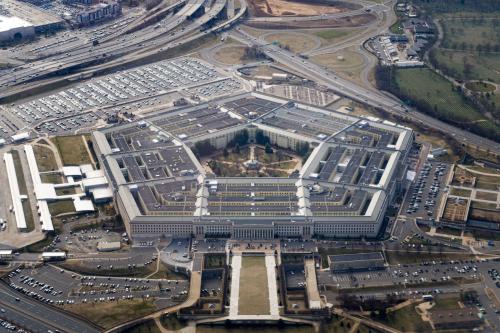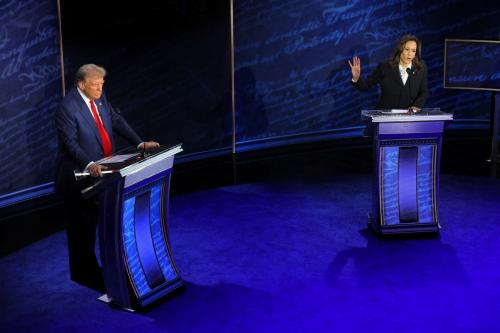Editor’s Note: Looking four years ahead to October 2016, Daniel Byman critiques the next administration’s foreign policy record, saying that whether Barack Obama or Mitt Romney is elected, the next president will have often faced overwhelming international challenges with limited U.S. influence.
Question: Is the following a critique of U.S. foreign policy during
Mitt Romney
’s first term or
President Obama
’s second term?
October 2016-
To say that the administration has dropped the ball on foreign policy would be a gross understatement.
The full list of disasters resulting from neglect and inaction is too long to recount, but we can highlight the most damning: Israel and the Palestinians are further from peace than ever. Egypt’s once-promising move toward democracy has stalled as the Muslim Brotherhood government has become more authoritarian. Narcotics continue to flow north into American cities while a drug war bleeds our southern neighbor. And of course, the Europeans still have not gotten their economic house in order.
Yet, the administration’s greatest failures came about in those key moments when it lacked decisiveness, ignored complexity and relied on flawed analysis. In Syria, it refused to deploy the U.S. airpower that had been so effective in Libya. Instead, it embraced an effort to arm the self-evidently ineffective and incoherent opposition in its doomed effort to overthrow Bashar al-Assad. The administration said Assad’s fall was inevitable but refused to make it so. Thousands died as Washington fiddled; instability and violence spread into Lebanon, Iraq and Jordan; and U.S. weapons leaked into terrorist hands. Now civil war has virtually engulfed the most strategic region in the world, making it a playground for al-Qaeda and Iran’s Quds Force.
The administration’s effort to get tough on China also backfired. Rather than seek to integrate a power whose unstoppable rise was clear to all who cared to look, the administration built up the U.S. military presence in Asia, criticized China’s human rights abuses and increased trade restrictions on Chinese goods. Beijing responded with predictable wrath and flexed its new muscles, slowing its purchases of U.S. Treasury bills and restricting U.S. goods coming into China, which plunged the United States back into recession. China is now doubling its defense budget, demanding that Washington end military assistance to Taiwan and making grandiose claims about extending its territorial waters — leaving us with the miserable choice of abandoning our allies to a bully or risking military conflict.
The chaos in Syria and the setbacks in China, however, are nothing next to the looming war between India and Pakistan, which threatens to be the first war between two nuclear powers. The administration focused on the problems of the past, wasting its energy on East Asia, Europe and the Middle East, and missed the obvious crisis in South Asia.
Despite repeated acts of terrorism sponsored by Pakistan against India, somehow the administration failed to heed its own intelligence predicting the brutal Lashkar-i-Taiba attacks on hotels and tourist sites in Mumbai last month — attacks that paralleled strikes in 1993, 2006 and 2008. (Just see today’s Washington Post column by David Ignatius, in which he quotes intelligence warnings about the risk of a terrorist attack emanating from Pakistan and describes the heroic but unsuccessful efforts of senior military and counterterrorism officials to get the administration to listen.) Policy toward the subcontinent before the attacks consisted of drone strikes, troop withdrawals from Afghanistan and neglect — no wonder Pakistan thought it could act with impunity.
This time, however, India is not turning the other cheek. Nationalistic politicians are calling for blood, and India is massing troops along the border. Had the administration not spent the past four years obsessing about a possible Israeli strike on Iran — a transparent bluff — it might have prevented the escalation toward nuclear war that now confronts us.
Answer: Either one — take your pick.
Will all the failures described here come to pass in the next four years? Probably not. But international crises occur during virtually every administration, and a Romney presidency or an Obama second term would be no exception. And when crises happen, opponents and experts will decry Washington’s responses as failures. These problems were “inevitable” or “obvious” or “preventable,” they’ll say.
While the criticisms may ring true in hindsight, they’ll be unfair. Presidents must act before history is written, often with incomplete information and uncertain odds. (Imagine perceptions of Obama’s foreign policy credentials if the raid on Osama bin Laden’s compound had failed, as it easily could have.)
At times we truly face no-win situations. Syria, no matter what the United States does, will have a grim future. Meanwhile, Washington has tried to engage Beijing, but China is still increasingly aggressive in Asia. A tougher U.S. stance might make China throw its weight around even more; then again, a softer American approach might make the Chinese sense weakness. Which stance is right? Whichever one happens to work out — and it’s very hard to know ahead of time which one will.
Even as we criticize policy failures, we often ignore real achievements. Most victories are subtle and apparent only in hindsight. Peace has prevailed among the great powers for decades. We have avoided nuclear conflict. Democracy has spread, albeit fitfully, across the globe. These are huge successes, but we take them for granted, even as we dissect the problem of the day in exhaustive and damning detail. Our perceptions change only slowly, with the benefit of time. George H.W. Bush, for instance, is increasingly considered a skilled foreign policy president, even though he left office with the Balkans descending into the abyss and Saddam Hussein clinging to power — two “failures” that many thought would forever taint his legacy.
With foreign policy problems, the United States is usually choosing between bad and risky options: For example, do you let Iran go nuclear, or do you conduct or support a military strike that could fail and backfire? Timing, implementation and luck all come into play. Indeed, the United States needs to plan for failure as well as success.
Americans like to think that all problems can be solved and that, if they aren’t, incompetence or malfeasance is to blame. Often, however, the challenge is overwhelming and U.S. influence is limited. The problem is not that Democrats are wimps, that Republicans are warmongers or that Washington’s halls of power are filled with the greedy and the hapless, but rather that few foreign policy problems can truly be solved. Most can at best be managed, and just getting by is often the best we can do.
This should be the standard by which the foreign policy of the next administration is measured. But one of the few sure predictions we can make is that it won’t be.



Commentary
Op-edA Preemptive Strike on the Foreign Policy Failures of the Next Administration
October 12, 2012